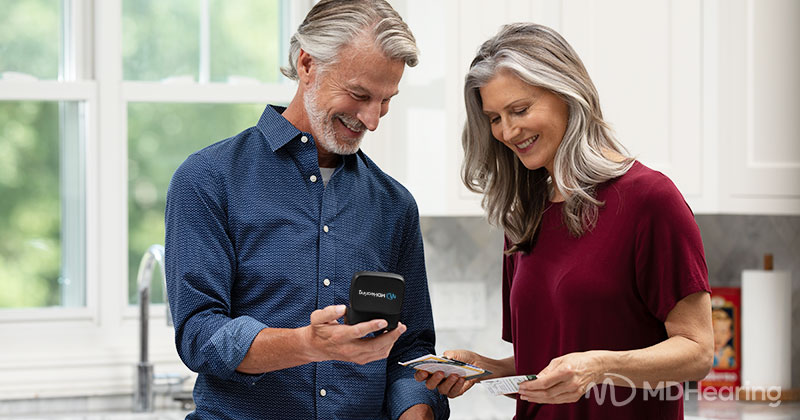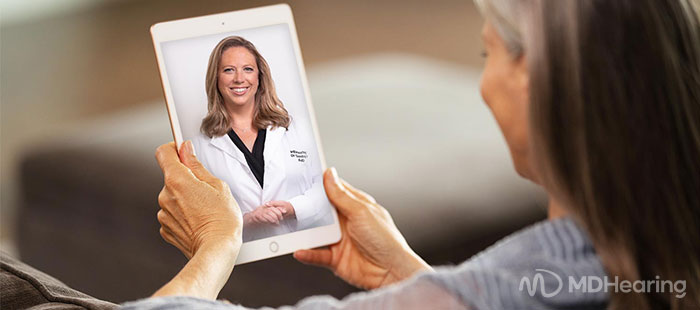When using a hearing aid for the first time, the experience can be a bit confusing. Unlike eyeglasses—where you simply put them on and everything comes into focus—hearing aids take time to get used to, especially if you've never worn them before.
Along with learning how a hearing aid works, you’re also relearning how to hear. There are sounds you haven’t heard (or heard clearly) in quite some time, and your brain has forgotten how to prioritize these sounds, making them seem too loud at first (such as footsteps, a clock ticking, or even your own voice).
The more you wear your hearing aids, the more your brain will relearn how to interpret different sounds and focus on what you want to hear.
Here are 7 tips for first time hearing aid users.
1. Start small.
Start by wearing your hearing aids at home for a few hours at a time. This will allow you to get used to the sound quality in your living space without being overwhelmed. Wear them a little longer each time, working up to a full day of use. With each day, you’ll get better at identifying sounds and focusing on voices.
Remember that your brain is relearning and that hearing aids take some time to get accustomed to. Don’t be alarmed if you need to wear them for a few days, or even weeks, before they feel comfortable.
2. Enlist the help of family and friends.
Loved ones can be really helpful during the hearing aid adjustment process. This can give you an opportunity to practice speaking comfortably in a group. This helps your brain relearn the associations between sounds, words, and nonverbal body language.
Try to practice with people you know well, since these familiar voices are the easiest for your brain to identify and interpret. Your loved ones also can help you adjust by setting the television at a comfortable volume to their ears, giving you the chance to listen and adjust to these new volumes.
3. Pair reading and listening.
Prior to getting hearing aids, you may have been told to “stop shouting”. It’s natural to talk loudly when you experience hearing loss, but with hearing aids, you can properly regulate your own volume.
A good way to get in the habit of this is by reading aloud to yourself while wearing your hearing aids. It’s also helpful to read along with a matching audio book, or to use an auditory rehabilitation app. Pairing reading with listening not only helps you determine the appropriate volume for speech, but it also helps your brain get further reacquainted with associating sounds, words, and speech.
4. Keep track of progress and celebrate wins.
A hearing journal is a great way to keep track of your progress. Write down any noises that bother or irritate you. If the clock’s ticking seems too loud and starts to annoy you, make a note of it. If you still struggle to hear conversations in a crowded restaurant, write it down. Evaluate these same noises each week, or even every few days. By keeping track, you can assess whether your brain is adjusting, and discuss any issues with a hearing specialist.
Remember, relearning to hear takes time. You’re going to experience sounds a little different through hearing aids than you may remember experiencing them before hearing loss. That’s okay! Celebrate the improvements to your hearing, even if it’s not exactly the same as before.
5. Don’t adjust the volume too much.
When wearing hearing aids for the first time, it may be tempting to turn down the volume when you are going into a loud restaurant or turn it up when walking into a library. By doing this, though, you are interfering with the hearing adjustment process.
Additionally, some hearing aids automatically adjust to different listening environments. If your hearing aids have an automatic program, you shouldn’t need to manually adjust your hearing aids much at all.
6. Take advantage of licensed support.
We can’t stress enough the importance of choosing a hearing aid provider with dedicated, licensed support. A licensed professional plays a significant role in your hearing health, even when you choose to buy hearing aids remotely.
That’s why MDHearing has assembled a team of credentialed audiologists and licensed hearing professionals with decades of experience in the field to make sure you get the most out of your hearing. Our team is available to advise you on how to fit and wear your hearing aids, help you troubleshoot, and provide alternative sizes of parts to better suit your needs.
7. Be patient.
Possibly the most important tip for first time hearing aid users is to have patience. The hearing aid adjustment process takes time, whether you’re a first time hearing aid user or trying a new set of hearing aids. You need to be patient with yourself and your hearing aids.
MDHearing offers a 45-day risk-free trial period because we want you to have ample time to try and get comfortable with your new hearing aids before you decide if they’re right for you. With time and patience, you will start hearing effortlessly and be able to reconnect with life again.
Start a risk-free trial with MDHearing today.
BROWSE HEARING AIDS


